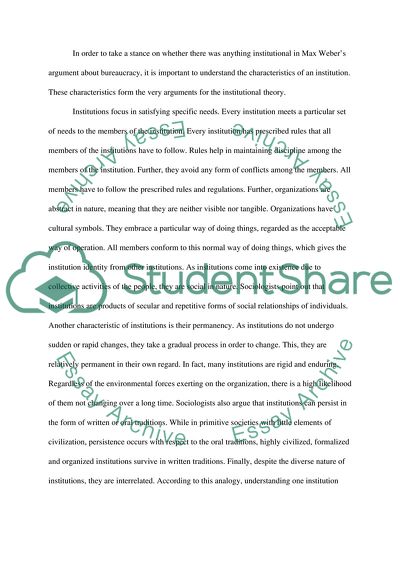Cite this document
(“Institutions and Max Webers Bureaucracy Term Paper - 1”, n.d.)
Retrieved from https://studentshare.org/sociology/1633724-is-there-anything-institutional-in-what-weber-said-about-bureaucracy-if-yes-what-is-it-and-which-of-the-institutional-theorists-whom-we-have-read-for-this-course-does-weber-seem-most-reminiscent-of-and-in-what-ways
Retrieved from https://studentshare.org/sociology/1633724-is-there-anything-institutional-in-what-weber-said-about-bureaucracy-if-yes-what-is-it-and-which-of-the-institutional-theorists-whom-we-have-read-for-this-course-does-weber-seem-most-reminiscent-of-and-in-what-ways
(Institutions and Max Webers Bureaucracy Term Paper - 1)
https://studentshare.org/sociology/1633724-is-there-anything-institutional-in-what-weber-said-about-bureaucracy-if-yes-what-is-it-and-which-of-the-institutional-theorists-whom-we-have-read-for-this-course-does-weber-seem-most-reminiscent-of-and-in-what-ways.
https://studentshare.org/sociology/1633724-is-there-anything-institutional-in-what-weber-said-about-bureaucracy-if-yes-what-is-it-and-which-of-the-institutional-theorists-whom-we-have-read-for-this-course-does-weber-seem-most-reminiscent-of-and-in-what-ways.
“Institutions and Max Webers Bureaucracy Term Paper - 1”, n.d. https://studentshare.org/sociology/1633724-is-there-anything-institutional-in-what-weber-said-about-bureaucracy-if-yes-what-is-it-and-which-of-the-institutional-theorists-whom-we-have-read-for-this-course-does-weber-seem-most-reminiscent-of-and-in-what-ways.


